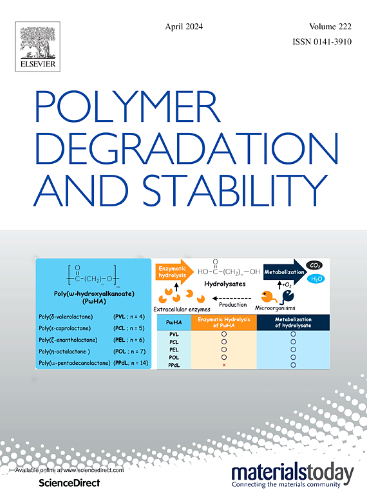New high UV transparency PV encapsulants: Properties and degradation after accelerated UV aging tests
IF 6.3
2区 化学
Q1 POLYMER SCIENCE
引用次数: 0
Abstract
To increase the PV modules efficiency, it is very important to improve not only the solar cell production technology, but also the other materials needed in their manufacture. Encapsulant materials, used to ensure the long-term lifespan and stability of solar cells, play an important role in PV module reliability. In fact, most modules breakdowns are linked precisely to the type of polymeric film used in their manufacturing. A detailed understanding of the causes and processes of PV module degradation and material is crucial for a successful development of new components and design of durable and reliable PV module. This article focuses on new high UV transparency polymeric materials usable for Si-based cells encapsulation and carries out thorough testing to evaluate their damaging caused by exposure to UV radiation. To obtain a reasonable evaluation of reliability of these highly UV transparent films, they were exposed to accelerated aging in a climatic chamber and then the changes in their optical, chemical and structural properties were analysed. The evaluating of the effect of UV radiation was also carried out on electrical performance of PV mini-devices made in the laboratory with the new encapsulants. Results have shown that, between the different UV transparent films tested, thermoplastic polyolefin-based encapsulants have a higher stability in long-term behaviour.
求助全文
约1分钟内获得全文
求助全文
来源期刊

Polymer Degradation and Stability
化学-高分子科学
CiteScore
10.10
自引率
10.20%
发文量
325
审稿时长
23 days
期刊介绍:
Polymer Degradation and Stability deals with the degradation reactions and their control which are a major preoccupation of practitioners of the many and diverse aspects of modern polymer technology.
Deteriorative reactions occur during processing, when polymers are subjected to heat, oxygen and mechanical stress, and during the useful life of the materials when oxygen and sunlight are the most important degradative agencies. In more specialised applications, degradation may be induced by high energy radiation, ozone, atmospheric pollutants, mechanical stress, biological action, hydrolysis and many other influences. The mechanisms of these reactions and stabilisation processes must be understood if the technology and application of polymers are to continue to advance. The reporting of investigations of this kind is therefore a major function of this journal.
However there are also new developments in polymer technology in which degradation processes find positive applications. For example, photodegradable plastics are now available, the recycling of polymeric products will become increasingly important, degradation and combustion studies are involved in the definition of the fire hazards which are associated with polymeric materials and the microelectronics industry is vitally dependent upon polymer degradation in the manufacture of its circuitry. Polymer properties may also be improved by processes like curing and grafting, the chemistry of which can be closely related to that which causes physical deterioration in other circumstances.
 求助内容:
求助内容: 应助结果提醒方式:
应助结果提醒方式:


